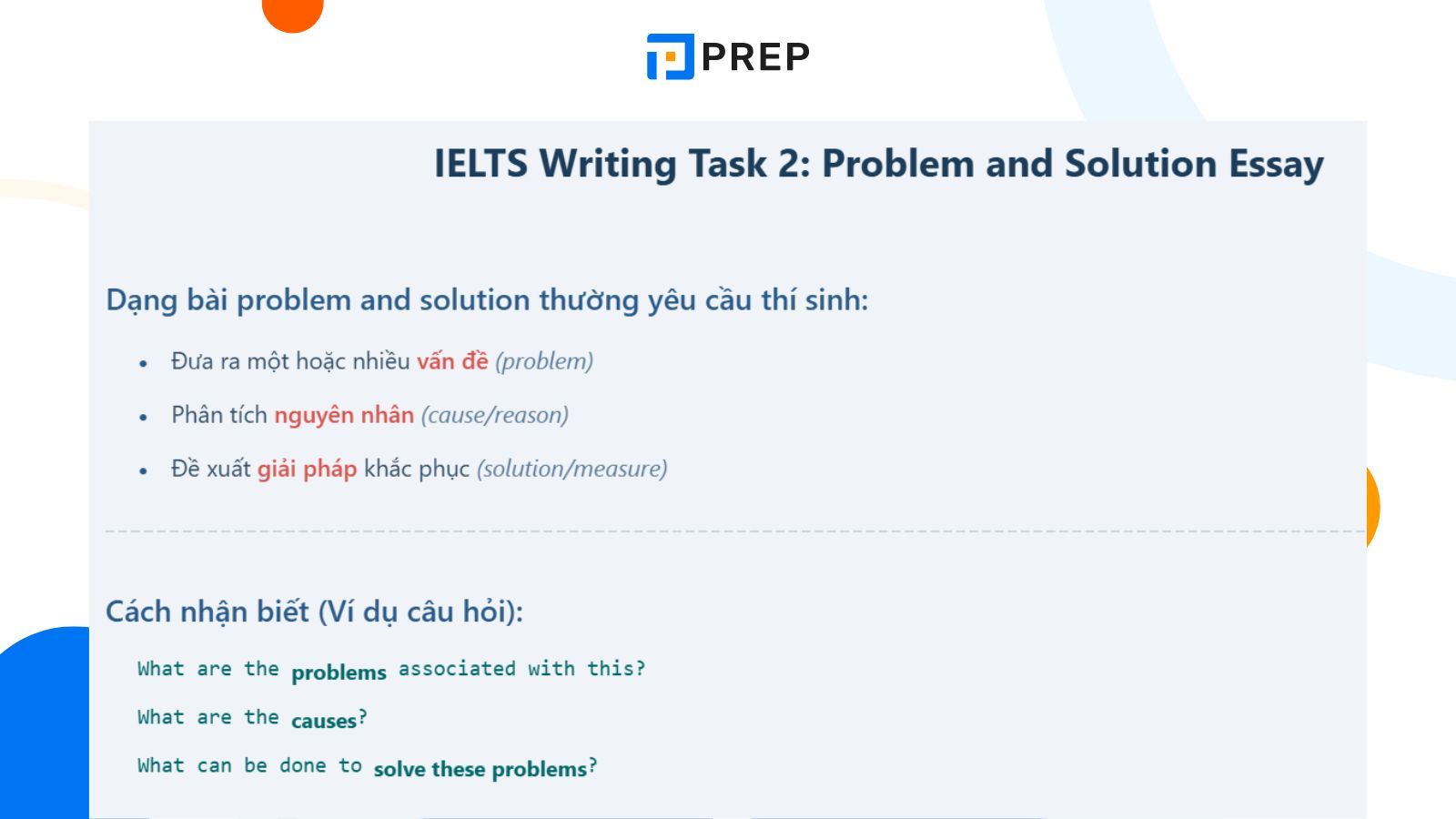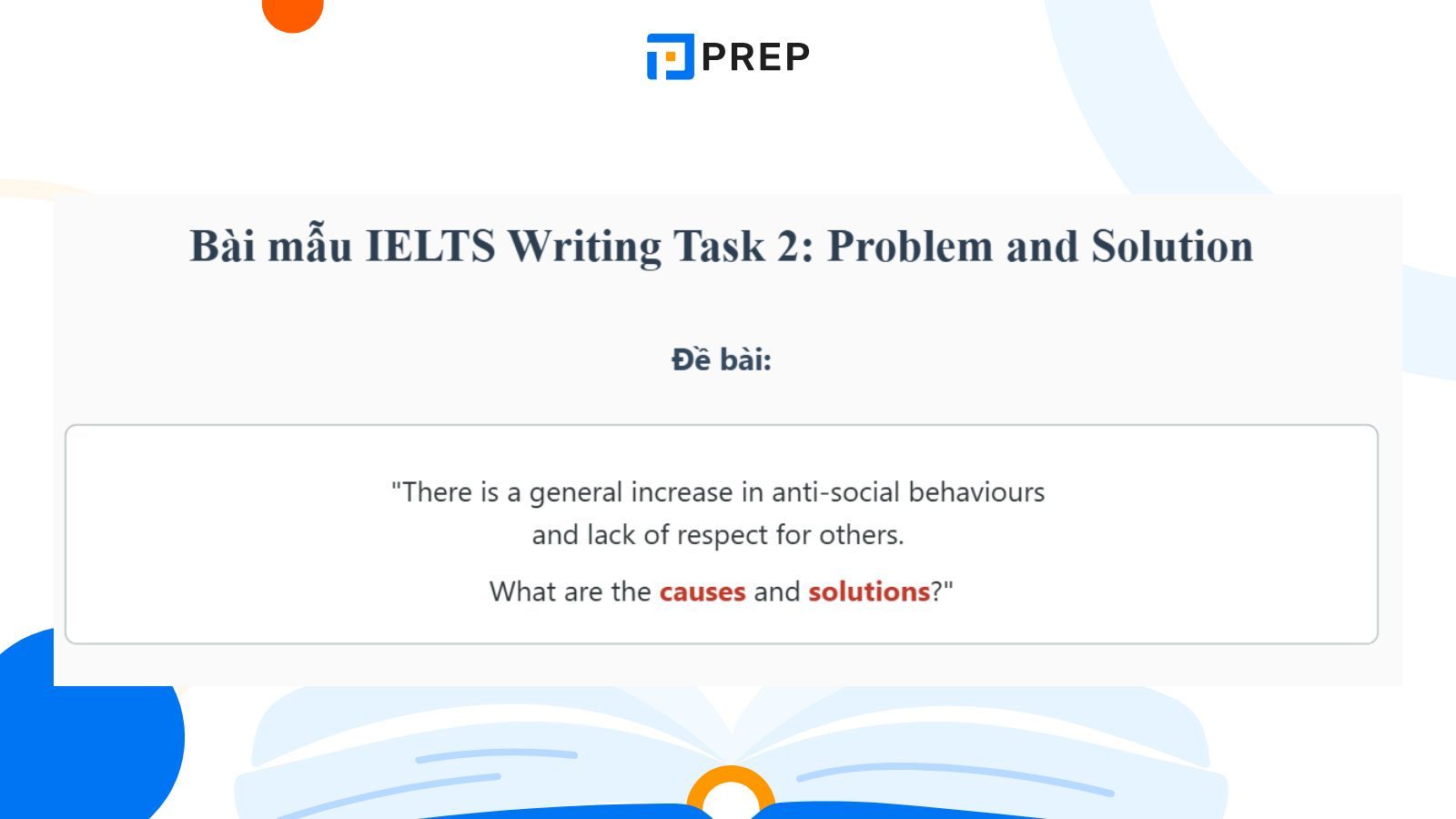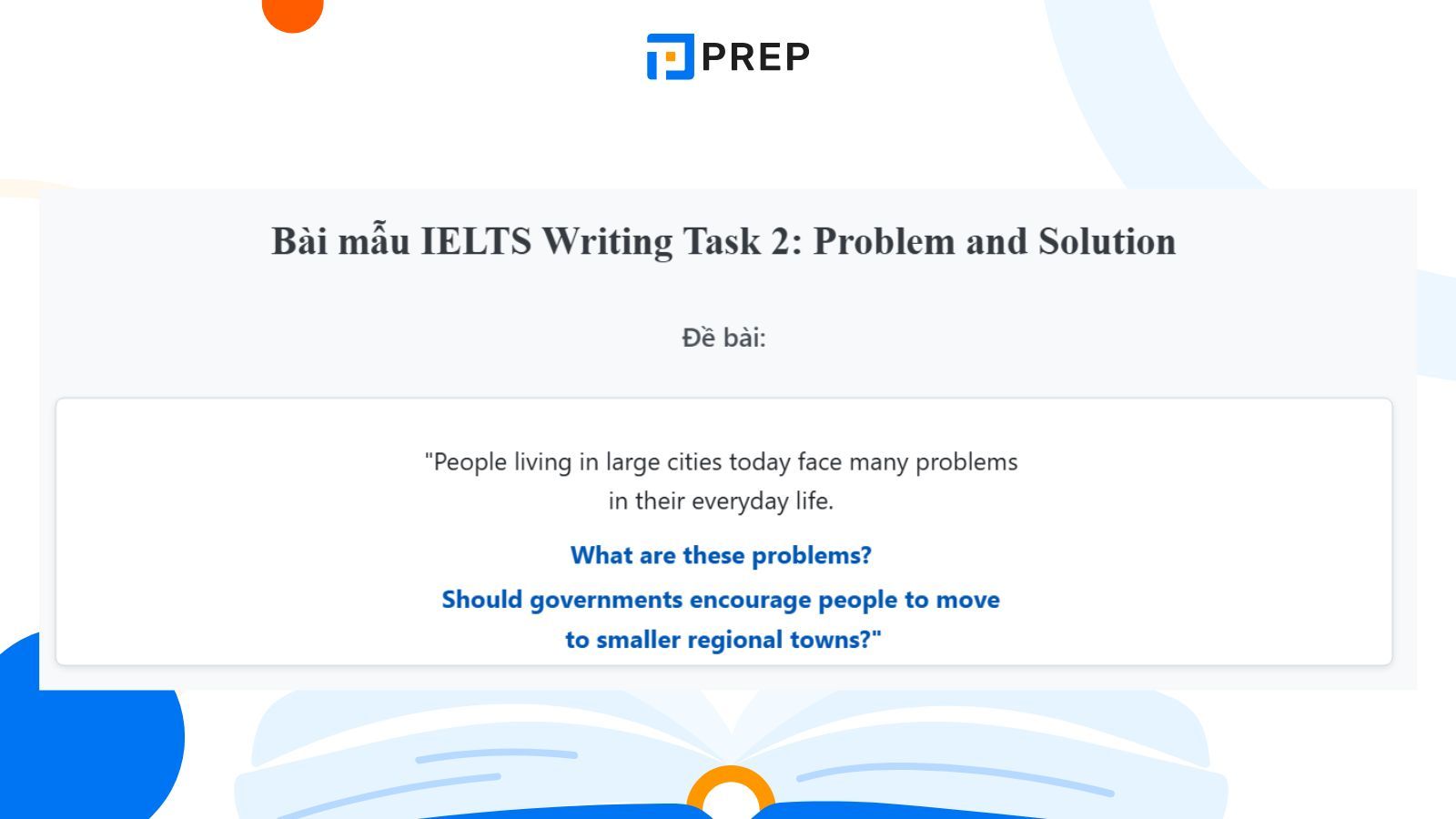IELTS Writing Task 2 Problem and Solution: Cách viết, Bài mẫu
Trong IELTS Writing Task 2, Problem and Solution là một trong những dạng bài phổ biến nhất. Dạng này yêu cầu thí sinh phân tích một vấn đề đang tồn tại trong xã hội và đề xuất những giải pháp hợp lý để khắc phục tình trạng đó. Việc nắm vững cấu trúc đề thi IELTS Writing Task 2 Problem and Solution sẽ giúp bạn viết bài một cách logic, rõ ràng và đạt band cao.
Trong bài viết hôm nay, PREP sẽ giới thiệu đến bạn khái niệm, cách nhận biết, cách viết, cùng một số bài mẫu để bạn tham khảo nhé!

I. IELTS Writing Task 2 Problem and Solution là gì?
Dạng bài problem and solution thường yêu cầu thí sinh:
-
Đưa ra một hoặc nhiều vấn đề (problem)
-
Phân tích nguyên nhân (cause/reason)
-
Đề xuất giải pháp khắc phục (solution/measure)
Trong đề thi IELTS Writing Task 2 problem and solution, bạn sẽ thấy các câu hỏi như:
-
What are the problems associated with this?
-
What are the causes?
-
What can be done to solve these problems?

Ví dụ đề bài: "The internet has transformed the way information is shared and consumed, but it has also created problems that did not exist before. What are the most serious problems associated with the internet and what solutions can you suggest?"
II. Cách viết IELTS Writing Task 2 Problem and Solution Essay
1. Introduction (Mở bài)
-
Paraphrase lại đề bài.
-
Nêu rõ vấn đề và giải pháp chính sẽ được triển khai trong thân bài.
2. Body Paragraph 1 (Thân bài 1)
-
Topic sentence: Đưa ra vấn đề/điều gây ra tình trạng.
-
Supporting ideas + example: Triển khai lý do, nguyên nhân với ví dụ cụ thể.
3. Body Paragraph 2 (Thân bài 2)
-
Topic sentence: Giới thiệu giải pháp để khắc phục vấn đề.
-
Supporting ideas + example: Triển khai hướng giải quyết có tính thuyết phục.
4. Conclusion (Kết luận)
-
Tóm tắt lại nguyên nhân và giải pháp.
-
Nhấn mạnh tầm quan trọng của việc áp dụng giải pháp.

III. Bài mẫu IELTS Writing Task 2 Problem and Solution
1. Bài mẫu 1

Đề bài: "There is a general increase in anti-social behaviours and lack of respect for others. What are the causes and solutions?"
Bài mẫu tham khảo:
“The widespread presence of anti-social behaviour and disrespectful attitudes towards others has long been a prevalent issue in society today. This often derives from the indifference of parents towards their children’s moral development, and sometimes from social problems such as violence and discrimination which exist in many parts of the world. This situation should be addressed by strong remedies, including better parental education and stricter law enforcement against violent and discriminatory activities in society.
Reasons for this alarming situation vary. In some places, people may hold an anti-social attitude or disrespect others because they live in an environment where violence and discrimination are the norm. Children of sexist parents in rural families in Vietnam, for example, show a worrying tendency of disrespecting women. In some other cases, it is the lack of parental guidance that is to blame. As modern parents are becoming increasingly busy with their jobs, they may have the proclivity to be indifferent to their children’s moral education. When there is no one to help young children distinguish between right and wrong, ill-mannered attitudes may emerge and develop among them without being controlled.
A number of strong measures could be adopted by the government and families to mitigate the problem. On the national level, the government should take definite actions against violence and discrimination. This could be done by ensuring strict enforcement of the laws on violent and discriminatory acts to deter them from happening. In addition, on the nuclear-family level, parents need to reaffirm their role in morally guiding their children. If they notice any signs of antisocial or insolent behaviour in children, the children should be reprimanded accordingly. Parents, at the same time, could also educate their children about social manners by instilling a moral code in them. These actions, albeit small, could have a strong influence on children when they grow up.
In conclusion, it is clear that violence, discrimination and the indifference of parents to children’s education are the major catalysts for the increase in anti-social behaviour and disrespect towards others. Strong measures such as stringent law enforcement on violent and discriminatory acts should be taken to alleviate this distressing situation.”
338 words, written by Tu Pham.
2. Bài mẫu 2

Đề bài: "People living in large cities today face many problems in their everyday life. What are these problems? Should governments encourage people to move to smaller regional towns?"
Bài mẫu tham khảo:
“In many major cities around the world, residents are confronted with a range of serious issues that impact their daily lives. This essay will outline some of these urban problems and explain why relocating to regional areas should be encouraged by governments.
One of the most pressing issues in big cities is traffic congestion. With a growing number of vehicles on the road and limited infrastructure, commuting can be time-consuming and stressful. For example, in cities like Bangkok or Jakarta, it is common for people to spend hours in traffic each day. Another significant concern is the high cost of living, particularly in terms of housing. As demand for accommodation increases, so do property prices and rent, making it difficult for average citizens to afford a comfortable lifestyle.
To alleviate these problems, governments should promote the development of smaller towns and incentivize people to relocate. Firstly, investing in infrastructure, healthcare, and education in regional areas can attract more residents and businesses. This would help reduce the population pressure on big cities and create a more balanced distribution of resources. Additionally, offering financial support or tax breaks to individuals or companies willing to move can serve as a powerful motivation for migration.
In conclusion, large cities are currently struggling with traffic congestion and the rising cost of living, which severely affect the quality of life for urban residents. Encouraging movement to regional towns through strategic investments and incentives is a viable solution that governments should actively pursue.”
246 words, written by Tu Pham.
Thông qua bài viết trên, PREP muốn giới thiệu cách viết dạng bài Causes and Solution chi tiết nhất đến với các bạn Preppies. Hãy luyện tập phân tích đề bài, lên dàn bài và viết bài thường xuyên, bên cạnh đó là trau dồi từ vựng và ngữ pháp để có thể hoàn thành tốt bài thi IELTS Writing Task 2. Hy vọng rằng bài viết sẽ phần nào đó giúp bạn ôn thi IELTS hiệu quả hơn và đạt được band điểm thật cao.
Học IELTS Writing tại PREP, bạn sẽ được hỗ trợ qua quy trình chấm bài chuyên sâu với công nghệ AI và đội ngũ thầy cô giàu kinh nghiệm. Lớp đầu tiên, AI độc quyền sẽ giúp bạn sửa lỗi từ vựng và ngữ pháp. Lớp thứ hai, giáo viên sẽ kiểm tra và chỉ ra các lỗi nghiêm trọng, gây ảnh hưởng đến điểm số bài thi của bạn.
Thầy cô sẽ dựa trên bộ 4 tiêu chí chính và 11 tiêu chí phụ để đánh giá chi tiết và giúp bạn sửa chữa các lỗi sai một cách bài bản.
Điểm mạnh của bạn sẽ được ghi nhận để phát huy, còn điểm yếu sẽ được thầy cô giúp bạn cải thiện qua lộ trình học rõ ràng.
Đăng ký khóa học TẠI ĐÂY hoặc gọi HOTLINE 0931428899 để nhận tư vấn.
Tải app PREP để học IELTS Writing trực tuyến tại nhà với chương trình luyện thi online hiệu quả.

Chào bạn! Mình là Hiền Hoàng, hiện đang đảm nhận vai trò quản trị nội dung sản phẩm tại Blog của website prepedu.com.
Với hơn 5 năm tự học các ngoại ngữ như tiếng Anh, tiếng Trung và ôn luyện một số kỳ thi IELTS, TOEIC, HSK, mình đã tự đúc rút được nhiều kinh nghiệm để hỗ trợ hàng nghìn người đang gặp khó khăn trong việc học ngoại ngữ. Hy vọng rằng những chia sẻ phía trên sẽ giúp ích cho bạn trong quá trình tự ôn luyện thi hiệu quả tại nhà!
Bình luận
Nội dung premium
Xem tất cảLộ trình cá nhân hoá
Có thể bạn quan tâm
Kết nối với Prep

MSDN: 0109817671.
Địa chỉ liên hệ: Tòa nhà Vinaconex, 34 Láng Hạ, phường Láng, TP Hà Nội.
Trung tâm CSKH tại HN: Lô 21 C2 Khu đô thị Nam Trung Yên, phường Yên Hòa, TP Hà Nội.
Trung tâm CSKH tại HCM: 288 Pasteur, Phường Xuân Hòa, TP Hồ Chí Minh
Trụ sở Công ty: Số nhà 20, ngách 234/35 đường Hoàng Quốc Việt, phường Nghĩa Đô, TP Hà Nội.
Phòng luyện ảo - Trải nghiệm thực tế - Công nghệ hàng đầu.
Hotline: 0931 42 8899.
Trụ sở Công ty: Số nhà 20, ngách 234/35 đường Hoàng Quốc Việt, phường Nghĩa Đô, TP Hà Nội.
Giấy chứng nhận hoạt động đào tạo, bồi dưỡng số 1309/QĐ-SGDĐT ngày 31 tháng 07 năm 2023 do Sở Giáo dục và Đào tạo Hà Nội cấp.

























